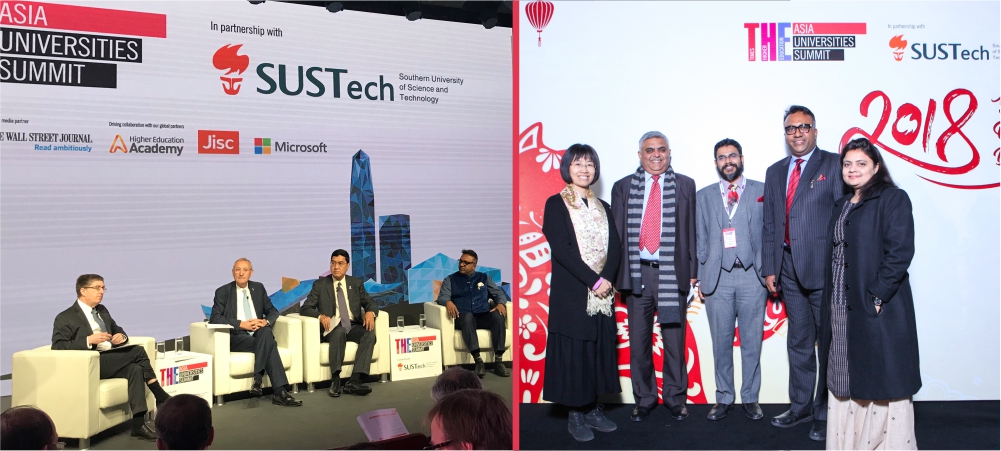Indian University invited to speak at the Times Higher Education Asia Universities Summit 2018
Sonipat: O.P. Jindal Global University (JGU) participated in the Times Higher Education (THE) Asia Universities Summit 2018 being held in partnership with the Southern University of Science and Technology (SUSTech) from 5-7 February 2018 in Shenzhen, China. JGU was the only Indian university invited to speak at the summit. Professor (Dr) C. Raj Kumar, Founding Vice Chancellor, JGU was among the 25 Vice Chancellors from across the world who spoke at the summit.
The summit witnessed participation of over 400 delegates from Asia’s best universities, top researchers, higher education leaders, policymakers and industry chiefs.
Professor Raj Kumar, a Rhodes Scholar and an alumnus of the University of Oxford and Harvard Law School is the only scholar and Vice Chancellor from India invited to speak on this special occasion. The JGU delegation also comprised Dr. Sanjeev P. Sahni, Professor and Principal Director, Jindal Institute of Behavioural Sciences; Arjya Majumdar, Associate Professor and Director, Office of Academic Planning, Co-ordination and Interdisciplinarity; Wenjuan Zhang, Associate Professor, Assistant Dean-International Collaborations and Executive Director-Centre for India-China Studies; and Ms. Pragnya Paramita Mohanty, Manager – Institutional Research, International Institute for Higher Education Research and Capacity Building, JGU.
This year’s summit was organised around the theme “Connecting Cities, Changing the World: Research Universities Building Asia”. The summit focused on themes including universities and cities – building alliances, defining regions; global research and education – trends, opportunities and challenges; university alliances – research output defining regional strength; national innovation – universities as catalysts and connectors; the power of partnership: what global research universities bring to the innovation economy; fourth industrial revolution and higher education – cultivating entrepreneurship, leading the future; and bridging divides – research universities in the global knowledge economy.
Professor Raj Kumar addressed a panel on “Breaking Boundaries – Research Universities in the 21st Century” that deliberated on the critical role of university research in the growth of the knowledge economy, and the importance of internationalisation strategies in eliminating regional and global barriers to collaboration.
Speaking at the summit Prof. Raj Kumar said “Universities have a larger role to play in the development of societies. They need to assume a leadership role that transcends national boundaries and are able to appreciate diversity and pluralism in all its forms and manifestations. Universities need to recognise that they have a special role in society.”
He added, “While societies become more myopic, it’s important for academics to continue to share perspectives to influence public opinion”. Responding to a question on challenging political leaders when there are value challenges, Professor Kumar said that while VCs might be more nuanced in their public engagement, dedicated advocacy arms in universities have a duty to speak out. Academic freedom is central to a university, but with all freedoms come responsibility. He also said that universities should be the vanguards in the pursuit of truth, and should promote truth via evidence – this is a key role for science and the social sciences to play in the 21st century.
To another question about internationalisation, Professor Kumar observed, “JGU is a unique example of internationalization. It is deeply committed to promoting international engagement through Building substantive collaborations with universities around the world. Universities need to enable these partnerships and it is through these collaborations that we can advance to cause of global understanding and educational cooperation.”
Responding to a question on university rankings, Professor Kumar stated, “I strongly believe that university rankings are important for providing opportunities for universities to benchmark themselves with regard to quality and excellence. Rankings help universities to redefine their vision and mission towards seeking ways to develop new institutional imaginations for the development of a knowledge society”.
The international forum witnessed participation of senior leaders of Asia’s best universities, top researchers, policymakers and industry chiefs representing higher education and governments along with industries from across the globe.
The summit is also an important platform to understand the key challenges that Indian universities face as they prepare to work towards becoming world class universities.
The 2018 Asia Universities Rankings results were announced at the sidelines of the summit. Singapore topped the rankings with the best university – National University of Singapore – for the third year in a row. THE has assessed that their consistent performance is a result of “improving its teaching and research environments, achieving a higher citation impact and securing higher levels of industry income.” Tsinghua University overtook Peking University to become the top Chinese institution in the rankings for the first time. According to THE, “Tsinghua has a much stronger publication output than Peking and increased its research income at a faster rate than its Beijing rival.” China has 63 universities featured in the rankings, with many previously lower-ranked institutions making progress this year. Japan is the most represented nation with 89 universities. India has 42 institutions represented in the rankings, with the Indian Institute of Science topping the list at 29.

